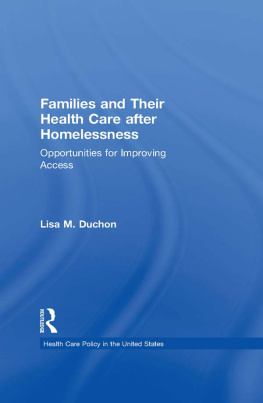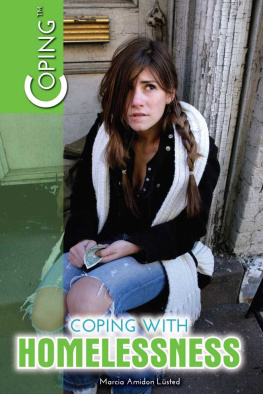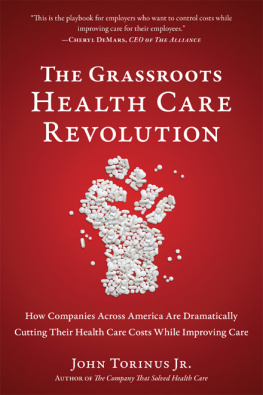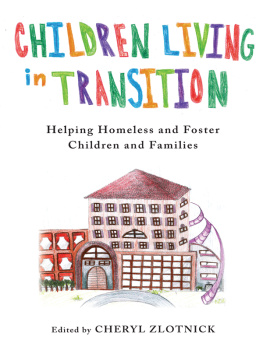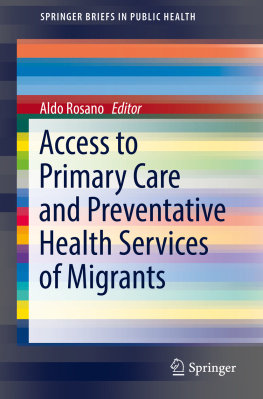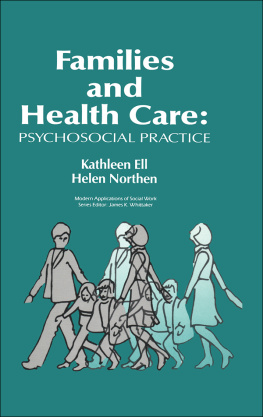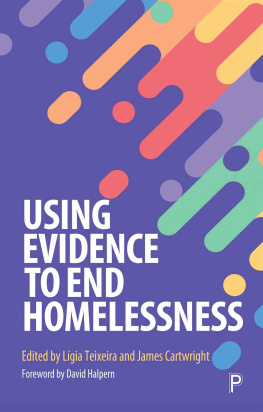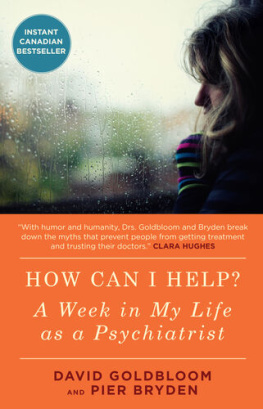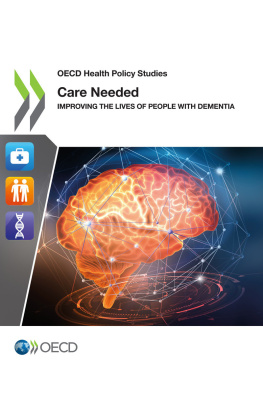Lisa M. Duchon - Families and Their Health Care After Homelessness: Opportunities for Improving Access
Here you can read online Lisa M. Duchon - Families and Their Health Care After Homelessness: Opportunities for Improving Access full text of the book (entire story) in english for free. Download pdf and epub, get meaning, cover and reviews about this ebook. City: London, year: 2014, publisher: Routledge, genre: Science / Politics. Description of the work, (preface) as well as reviews are available. Best literature library LitArk.com created for fans of good reading and offers a wide selection of genres:
Romance novel
Science fiction
Adventure
Detective
Science
History
Home and family
Prose
Art
Politics
Computer
Non-fiction
Religion
Business
Children
Humor
Choose a favorite category and find really read worthwhile books. Enjoy immersion in the world of imagination, feel the emotions of the characters or learn something new for yourself, make an fascinating discovery.
- Book:Families and Their Health Care After Homelessness: Opportunities for Improving Access
- Author:
- Publisher:Routledge
- Genre:
- Year:2014
- City:London
- Rating:4 / 5
- Favourites:Add to favourites
- Your mark:
- 80
- 1
- 2
- 3
- 4
- 5
Families and Their Health Care After Homelessness: Opportunities for Improving Access: summary, description and annotation
We offer to read an annotation, description, summary or preface (depends on what the author of the book "Families and Their Health Care After Homelessness: Opportunities for Improving Access" wrote himself). If you haven't found the necessary information about the book — write in the comments, we will try to find it.
Lisa M. Duchon: author's other books
Who wrote Families and Their Health Care After Homelessness: Opportunities for Improving Access? Find out the surname, the name of the author of the book and a list of all author's works by series.
Families and Their Health Care After Homelessness: Opportunities for Improving Access — read online for free the complete book (whole text) full work
Below is the text of the book, divided by pages. System saving the place of the last page read, allows you to conveniently read the book "Families and Their Health Care After Homelessness: Opportunities for Improving Access" online for free, without having to search again every time where you left off. Put a bookmark, and you can go to the page where you finished reading at any time.
Font size:
Interval:
Bookmark:
PENNSYLVANIA STATE
UNIVERSITY-HARRISBURG

All rights reserved
| Routledge Taylor & Francis Group 711 Third Avenue New York, NY 10017 | Routledge Taylor & Francis Group 2 Park Square, Milton Park Abingdon, Oxon OX14 4RN |
Families and their health care after homelessness : opportunities for improving access / Lisa M. Duchon.
p. cm. (Health care policy in the United States)
Revision of the author's thesis (Ph. D.)New York University, 1997.
Includes bibliographical references and index.
ISBN 0-8153-3146-0 (alk. paper)
1. Family-Medical carePennsylvaniaPhiladelphia Longitudinal studiesHistory 20th century. 2. Urban poor Medical carePennsylvaniaPhiladelphiaLongitudinal studies History 20th century. 3. Homeless personsMedical care PennsylvaniaPhiladelphiaLongitudinal studiesHistory 20th century. 4. PoorHousingHealth aspectsPennsylvaniaPhiladelphia-Longitudinal studiesHistory 20th century. I. Title. II. Series: Health care policy in the United States (New York, N.Y.)
RA564.9.H63H38 1998
362.10869420974811dc21
98-42309
Font size:
Interval:
Bookmark:
Similar books «Families and Their Health Care After Homelessness: Opportunities for Improving Access»
Look at similar books to Families and Their Health Care After Homelessness: Opportunities for Improving Access. We have selected literature similar in name and meaning in the hope of providing readers with more options to find new, interesting, not yet read works.
Discussion, reviews of the book Families and Their Health Care After Homelessness: Opportunities for Improving Access and just readers' own opinions. Leave your comments, write what you think about the work, its meaning or the main characters. Specify what exactly you liked and what you didn't like, and why you think so.

